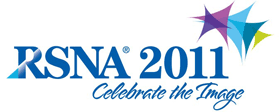
Abstract Archives of the RSNA, 2011
SSQ14-09
Clinical Utility of 18F FDG PET/CT and 99mTc MDP Bone Scintigraphy in Patients with Ewings Sarcoma and Other Sarcomas
Scientific Formal (Paper) Presentations
Presented on December 1, 2011
Presented as part of SSQ14: Pediatrics (Musculoskeletal)
Judy Nguyen MD, Presenter: Nothing to Disclose
Kara Davis MD, Abstract Co-Author: Nothing to Disclose
Erik Supratik Mittra MD, PhD, Abstract Co-Author: Nothing to Disclose
Neyssa Marina MD, Abstract Co-Author: Nothing to Disclose
Sanjiv S. Gambhir MD, PhD, Abstract Co-Author: Consultant, Arresto Bioscience, Inc
Grant, Bayer AG
Honorarium, Bayer AG
Founder, Cellsight Technologies, Inc
Stockholder, Cellsight Technologies, Inc
Advisory Committee, Centella Biotechnologies, Inc
Advisory Board, Endra, Inc,
Stockholder, Endra, Inc
Royalties, Reed Elsevier
Advisory Board, Enlight, Inc
Stockholder, Enlight, Inc
Scientific Advisory Board, General Electric Company
Grant, General Electric Company
Scientific Advisory Board, ImaginAb, Inc
Stockholder, ImaginAb, Inc
Scientific Advisory Board, Lumen Therapeutics
Stockholder, Stockholder, Lumen Therapeutics
Scientific Advisory Board, MagArray, Inc
Stockholder, MagArray, Inc
Honorarium, Merck & Co, Inc
Grant, Merck & Co, Inc
Scientific Advisory Board, MILabs
Consultant, NinePoint Medical, Inc
Stockholder, NinePoint Medical, Inc
Honorarium, Nordion, Inc
Stockholder, Prolume, Ltd
Scientific Advisory Board, RefleXion Medical, Inc
Stockholder, RefleXion Medical, Inc
Investor, RefleXion Medical, Inc
Consultant, Spectrum Dynamics Ltd
Stockholder, Spectrum Dynamics Ltd
Scientific Advisory Board, Varian Medical Systems, Inc
Scientific Advisory Board, VisualSonics Inc
Stockholder, VisualSonics Inc
Andrei Iagaru MD, Abstract Co-Author: Advisory Board, Siemens AG
Advisory Board, Spectrum Pharmaceuticals, Inc
99mTc-MDP has been the standard method for bone scintigraphy (BS) for more than 3 decades. The role of FDG PET/CT is proven in a variety of cancers for which it has changed the practice of oncology. There are few prospective studies comparing these 2 methods of detection of skeletal metastases in sarcoma patients. The purpose of this study was to compare FDG PET/CT and 99mTc-MDP BS in the detection of primary and/or metastatic osseous lesions.
48 consecutive patients with histopathological confirmation of Ewing’s sarcoma (EWS, n = 24) or other childhood sarcomas (rhabdomyosarcoma (n = 14), osteosarcoma (n = 5), synovial sarcoma (n = 3), spindle cell sarcoma (n = 1), high grade undifferentiated sarcoma (n = 1)) who had FDG PET/CT and 99mTc-MDP BS performed at our institution between 2003-2010 were included in this retrospective analysis. Only those patients who had these studies done within 1 month of each other were included. There were 24 males and 24 females, with an average age at time of diagnosis of 15.18 ± 8.1 years. Sensitivities and specificities were calculated for detection of osseous malignant lesions.
No differences in sensitivity or specificity between the PET/CT and BS were observed in these cohorts, except for detection of bone metastases from non-EWS where PET performed better than BS. PET/CT also detected disease outside the skeleton in 29.2% of EWS patients and 62.5% of non-EWS patients. In EWS, BS was 85.7% sensitive and 94.4% specific for detection of the primary lesions (n=22), while PET was 85.7% sensitive and 88.9% specific. For detection of osseous metastases (n=24), BS was 60% sensitive and 93.1% specific, while PET was 66.7% sensitive and 96.4% specific. In non-EWS, BS was 78.6% sensitive and 100% specific for detection of the primary osseous lesions (n=11), while PET was 76.9% sensitive and 100% specific. For detection of osseous metastases (n=25), BS was 33.3% sensitive and 97.4% specific, while PET was 66.7% sensitive and 100% specific.
While this is a small cohort and the results need to be confirmed in larger studies, it appears that FDG PET/CT may successfully provide similar information regarding skeletal lesions as BS in patients with sarcomas. In addition, FDG PET/CT detected disease outside of the skeleton in a significant number of EWS and non-EWS.
FDG PET/CT provides similar information regarding skeletal lesions as BS.
Nguyen, J,
Davis, K,
Mittra, E,
Marina, N,
Gambhir, S,
Iagaru, A,
Clinical Utility of 18F FDG PET/CT and 99mTc MDP Bone Scintigraphy in Patients with Ewings Sarcoma and Other Sarcomas. Radiological Society of North America 2011 Scientific Assembly and Annual Meeting, November 26 - December 2, 2011 ,Chicago IL.
http://archive.rsna.org/2011/11007319.html

